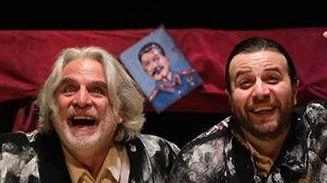“King Lear Died in Moscow,” Yiddish Horizon


A moment from the show
"And we will laugh at the golden butterflies". So King Lear, two steps from the abyss. Cordelia is dead. His Cordelia. And he finds himself alone once again, for a few moments, in a shaky world. That he has not been able to read. Lear is a complex tragedy. Five acts of intertwined plots at the Court of Britain, a powder keg since the elderly leader decided to abdicate and divide his kingdom between his three daughters Goneril, Regan and Cordelia. Only to do so he thought of proposing a slightly silly game: each will receive territories based on the love she will show towards her father. Cordelia refuses and is banished. But subsequent events and the war will painfully open the sovereign's eyes. A desperate parable. Human, too human. While we reason about power, filial love, madness and how words can seduce. This is the Shakespearean tradition. But what if everything were rethought in a Yiddish horizon? That's what Solomon Michoels and Venjamin Zuskin tried to do at Goset , the great Jewish Theater in Moscow . Crazy and wonderful. In the post-war Soviet Union . Before their adventure was crushed by Stalinist violence .
As César Brie tells in "King Lear is dead in Moscow", from today to June 15 in the Sala Fassbinder dell'Elfo Puccini . Written together with Leonardo Ceccanti (but with contributions from the entire ensemble), it sees the same authors on stage with Eugeniu Cornitel, Davide De Togni, Anna Vittoria Ferri, Tommaso Pioli, Annalesi Secco, Laura Taddeo and Alessandro Treccani. Nine interpreters.
To give life to this dream of an art theater made of songs, dances, poems, colors. A forgotten page of history. Where all the bloody Soviet censorship resurfaces. While on stage the characters of King Lear intertwine with Chagall 's paintings.
Diego Vincenti
© Reproduction reserved
Il Giorno





